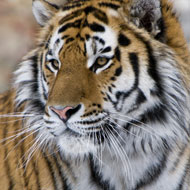Tributes to zoo keeper killed in Cambridgeshire

A full investigation is underway, but police say the death is not believed to be suspicious.(Stock photo)
A zoo keeper has died at Hamerton Zoo Park in Cambridgeshire after a tiger entered the enclosure with her.
The keeper has been named by the media as Rosa King, 33. She is reported to have died at the scene at around 11.15am yesterday (29 May).
In a statement, the zoo said the incident appears to have been a ‘freak accident’. At no point did the animals escape their enclosures and public safety was not affected. The tiger was unharmed and has not been euthanised, according to BBC News.
The zoo will be closed today (30 May) and a full investigation is underway, but police say the death is not believed to be suspicious.
Peter Davis, a visitor at the zoo, said he heard a “commotion” near the enclosure where Miss King was attacked.
“The next minute half a dozen zoo keepers came running down to the enclosure,” he told BBC News. “One of the girls, we just heard her scream. And one of the girls shouted ‘run’. So a few of us ran into one of the zoo keepers’ small rooms by the enclosure.”
The group were held in the room for around 10 minutes until they got the all-clear. “As we came out, we were sort of ushered further away, but we were still looking at what was going on, and you could obviously see the keepers all distressed, not really knowing what to do, heads in their hands. A couple of them were throwing meat over the enclosure to try and entice the tiger away.”
Tributes to Miss King have poured in, with her friend Garry Chisholm, a wildlife photographer, saying she was the “focal point” and the “shining light” of the zoo.
“Her passion for the animals in her care was exceptional though her favourites were undoubtedly the cheetahs which she would refer to as her pride and joy,” he told BBC News.
Her mother, Andrea King, said her daughter was dedicated to her job and “wouldn’t have done anything else, it’s what she has always done.”



 The Veterinary Medicines Directorate (VMD) is inviting applications from veterinary students to attend a one-week extramural studies (EMS) placement in July 2026.
The Veterinary Medicines Directorate (VMD) is inviting applications from veterinary students to attend a one-week extramural studies (EMS) placement in July 2026.